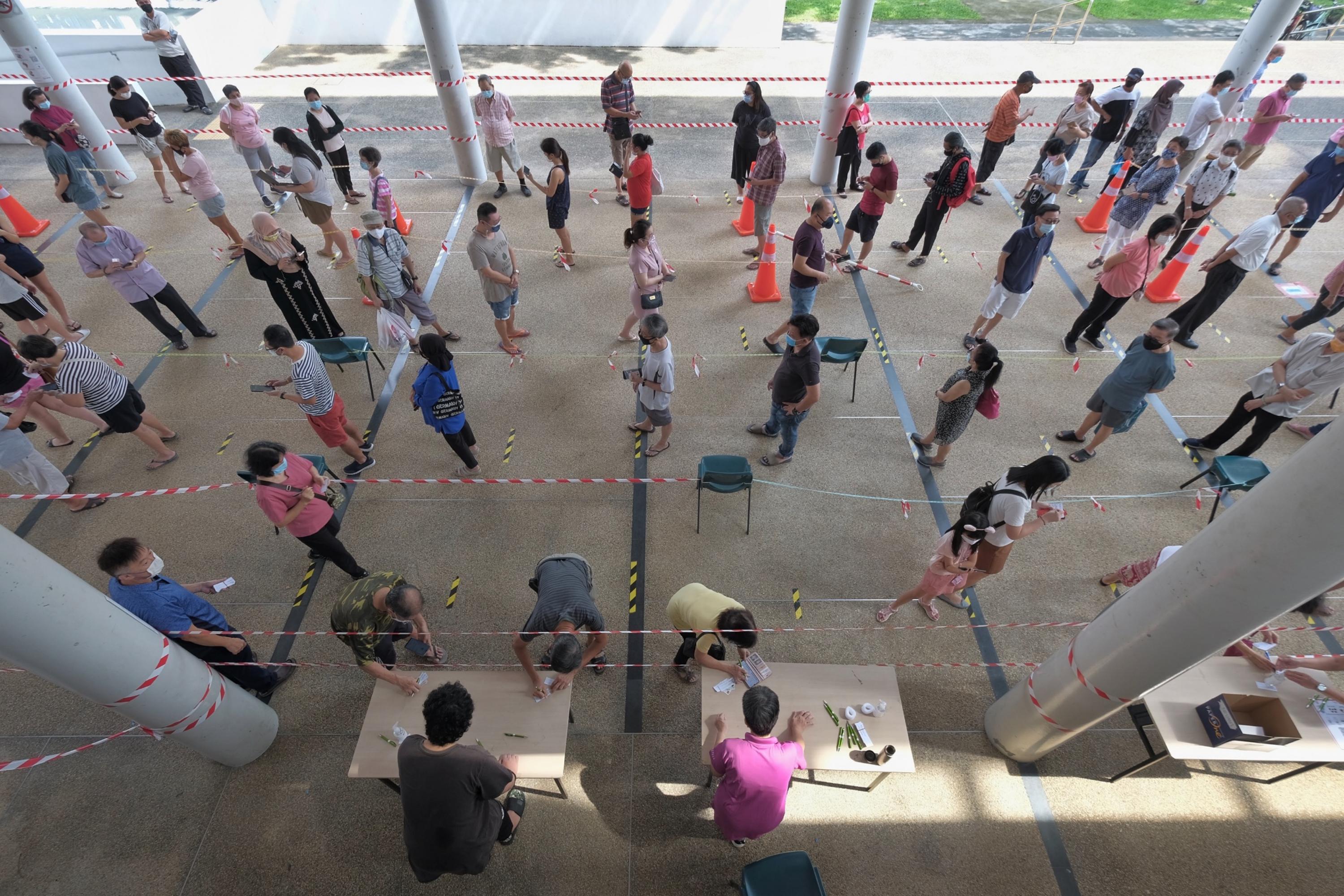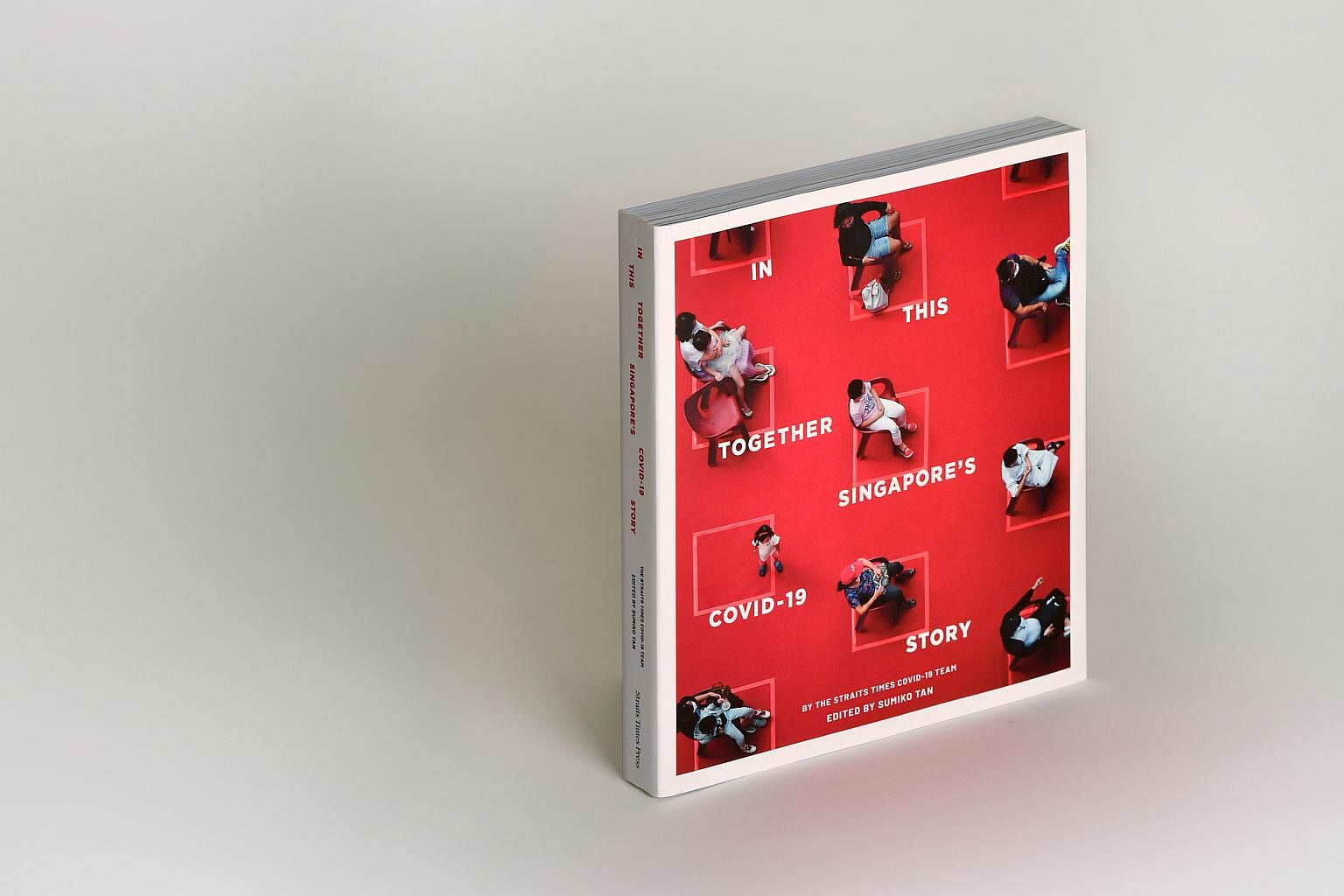S'pore's Covid-19 story: In the same storm, in different boats, but going the right way?
Sign up now: Get ST's newsletters delivered to your inbox

Residents queue to collect their TraceTogether tokens at a community club in December 2020.
PHOTO: ST FILE
Justin Ong
Follow topic:
SINGAPORE - Wearing a mask does not just protect you from Covid-19 - it protects others from you if you have an asymptomatic infection.
In this vein, all safe distancing measures are "really about that sense of solidarity with others", says Deputy Prime Minister Heng Swee Keat.
He was explaining, in an interview for a new book, why Singapore's third fiscal package in 2020 - out of an unprecedented five, totalling $100 billion in pandemic support measures - was named the Solidarity Budget.
The book, In This Together: Singapore's Covid-19 Story, arrives as the city state reaches the two-year mark in its fight against Covid-19.
At first glance, Singaporeans have largely accepted Covid-19 restrictions for the greater good, exemplifying the solidarity that Mr Heng spoke about.
But as the pandemic nears what some believe to be its "season finale", with the hope that the latest, highly transmissible yet milder Omicron strain could herald the start of living with the virus as people do with the flu, some questions are worth asking.
What lessons in solidarity can Singapore glean from its Covid-19 experience, given the pandemic-induced divides and distrust seen in societies around the world? How vulnerable - or hardy - is our state of social cohesion? As we emerge on the other side of a generational crisis, how do we keep Singaporeans "in this together"?
Public health scientists, sociologists and governance experts say there is cause for optimism, pointing to how Singaporeans have pulled together and responded to the pandemic through ground-up movements and aid for the needy.
But they also note that Covid-19 has produced polarised attitudes on policies, such as around vaccines, and aggravated socio-economic fault lines along class, ethnicity and nationality.
"The saying 'we are all in the same storm but different boats' is worth reflecting upon as we commemorate the second anniversary of Covid-19 in Singapore," said Associate Professor Jeremy Lim from the National University of Singapore's (NUS) Saw Swee Hock School of Public Health.
"Clearly, the pandemic has been trying for everyone, but the intensity of struggle and the support provided - very different."
But he added: "We are moving in the right direction, in the sense that at least the harsh spotlight of inequalities has been shone, and the public and policymakers are aware of 'invisible populations' and 'digital divides'.
"What matters is how we translate these lessons into improving the lives of all residents, as well as give peace of mind that the country - as a government and as a people - will look out for the least among us."
Interdependent people
In February 2020, in his first of several speeches on Covid-19, Prime Minister Lee Hsien Loong described the outbreak as a real test of Singapore's social cohesion and psychological resilience.
Globally, the pandemic has been a catalyst - and what it does to levels of cohesion hinges on a government's ability to fulfil its social contract with the people.
"Are policy decisions logical, evidence-informed, feasible, transparent, clearly explained? This has generally been the case in Singapore's Covid-19 response," said Associate Professor Natasha Howard, also from the Saw Swee Hock School of Public Health.
Social cohesion is also a function of trust - in public and private sector leadership, and in information sources. And polls such as the Edelman Trust Barometer show that trust is diminishing globally, Adjunct Professor Lutfey Siddiqi from NUS' Risk Management Institute pointed out.
Singapore, however, has bucked the trend by recording strong levels of trust in the ethics and competence of both government and business institutions.
"Singapore has also outperformed many others in its economic response to Covid-19, with gross domestic product now exceeding pre-pandemic levels," added Prof Siddiqi. "From a social cohesion point of view, the macroeconomic backdrop in Singapore should (also) help create resilience, not resentment."
Some experts say the pandemic has amplified the importance of collectivism and solidarity, on top of the self-reliance that is a core part of Singapore's national ethos.
"There is stronger awareness that we are a nation with interdependent individuals and families, rather than a nebulous crowd of self-sufficient individuals," said NUS sociologist Tan Ern Ser.
Associate Professor Andy Ho, who specialises in psychology and medicine at Nanyang Technological University, sees this in the numerous community efforts to help those most affected by the pandemic. He and the other experts cited initiatives to aid migrant workers, low-income households, seniors, students, hawkers and more.
Whither mutual trust?
By the time PM Lee delivered his National Day message in August last year, his assessment was that Singapore's social cohesion had "held", though this could not be taken for granted.
"Covid-19 has strained fault lines in our society, and brought up difficult issues that we need to deal with," he acknowledged.
An immediate pressure point is the lingering difficulty in achieving consensus on Singapore's overall Covid-19 strategy, said Associate Professor Alex Cook from the Saw Swee Hock School.
"With extremely high vaccination and booster rates... the disease is much less serious now," he noted. "Some people may see the remaining risk as being sufficiently high that we should keep the measures we currently have in place for the long term, while others - such as myself - see the risk as low enough that we should retire most or all of them and treat Covid-19 the same way we treat the flu."
Recent polls by the Institute of Policy Studies (IPS) showed divergent views on the issue, with just over half of respondents feeling positive about living with the virus as endemic - and agreeing with having vaccination-differentiated measures. Close to half backed unmasking when outdoors or in uncrowded areas, with a similar proportion expressing confidence in eating out.
Covid-19 measures have also hit small heartland businesses and food and beverage outlets harder than most, with many crumbling under a plethora of changing rules and the pressure of having to reinvent and transform, said Prof Lim.
He suggested this was driven by the Government's "underlying low trust in residents", even if the converse is untrue and people here have a high level of trust in the state.
"This signals in my mind that the Government's relationship with the governed is still somewhat infantile and immature," he said. "We still have some way to go to a partnership governed by mutual respect and mutual trust."
He also pointed to policies creating dichotomies within groups themselves, giving the example of the Business Travel Pass scheme, which allows senior executives based in Singapore and with regional or international roles to fly regularly. They can move in and out of the country with more ease than work pass holders, whose return is contingent on them obtaining entry approvals - a situation that has resulted in some families being separated for long periods.
The place of foreigners in Singapore's society, along with racial issues and the plight of lower-wage workers, make up the fault lines referred to by PM Lee in his National Day message. In his subsequent National Day Rally speech, he acknowledged that Covid-19 had intensified anti-foreigner sentiment and brought race relations under stress, leading to a glut of incidents over the last two years. He committed to tackling these issues through landmark measures like an upcoming law on racial harmony.
But Singapore ultimately also needs to work on new methods of creating understanding between people with different cultural compasses, said Dr Kalpana Vignehsa, a research fellow in IPS' governance and economy department.
"We should be exploring ways to connect with the messy nuance of one another's lived experiences," she said. "Because focusing on neat identity labels and passive learning about identity groups is unlikely to give us the momentum we want towards improved solidarity and cohesion."
She added that Singapore could further strengthen its social cohesion - which she believes to be already hardy and resilient - by continuing to openly negotiate fault lines from the ground up.
Speaking at an IPS conference on Jan 13, Health Minister Ong Ye Kung seemed to broach a loftier goal than cohesion.
As a nation's people undergo common trials and tribulations, "over time, this togetherness will forge common ideals that transcend primordial tribal instincts, and overcome forces that deepen social fault lines", he said.
"Then something mysterious emerges... like the soul of a nation."
Dr Vignehsa proposed that another route to forging "common ideals" was to ensure that all who choose to share in Singaporeans' space, whether in the long or short term, feel like they belong.
"Perhaps our 'soul' is tied up with feeling the warmth of Singapore's embrace, regardless of the groups we identify with," she said.
Prof Ho described the epitome of the "soul of a nation" as its people sharing "the same vision towards a greater good, with a joint conviction towards civic-mindedness and compassionate citizenry".
"(Such) collective consciousness... has immense potential to overcome differences," he said. "No matter how difficult they are."
Where to buy the book

ST PHOTO: STEPHANIE YEOW
In This Together: Singapore’s Covid-19 Story retails for $28 (with GST) at major bookstores.
It is also available online at the Straits Times Press website.

